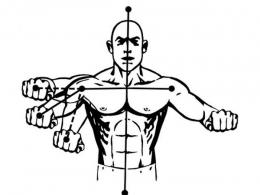How much protein is needed per 1 kg of weight
"Protein is king"
Protein (protein) is an incredibly important nutrient. Our body suffers if we don't get enough of it. However, there are completely different opinions about how much protein a person needs per day.
Most official dietary organizations recommend a rather modest amount of 0.8 grams of protein per kilogram of body weight.
- 56 grams per day for the average man;
- 46 grams per day for the average woman.
While this amount may be sufficient to prevent the development of a protein deficiency, studies show that it is not enough to maintain health and optimal shape. It turns out that the “right” amount of protein for each person depends on many factors, including their activity level, age, muscle mass, body type, and health status.
So, what is the optimal amount of protein per day, and how do lifestyle factors such as weight loss, muscle building and physical activity levels affect this indicator? Let's figure it out.
Protein: What is it and why is it needed?
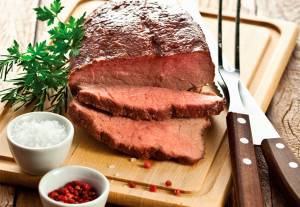 Proteins are the basic building blocks of the body. They make up muscles, tendons, organs and skin. Proteins are also enzymes, hormones, neurotransmitters, and various small molecules that perform important functions. Without protein, life would be impossible.
Proteins are the basic building blocks of the body. They make up muscles, tendons, organs and skin. Proteins are also enzymes, hormones, neurotransmitters, and various small molecules that perform important functions. Without protein, life would be impossible.
Proteins are made up of smaller particles called amino acids that are tied together like beads on a string. They form long protein chains, which then fold into complex shapes. Some of the amino acids can be synthesized by the body, while others must be obtained from food (these are called essential).
It is important to know how much protein you need to eat per day and what quality of protein you are consuming. Animal protein provides us with all the necessary amino acids in the right ratio (because animal tissues are similar to our own tissues). If you eat animal products (meat, fish, eggs, dairy products) every day, then there should be no problem with consuming the right amount of protein. If you don't eat animal products, getting all the proteins and essential amino acids your body needs is a little more difficult.
Most ordinary people do not need protein supplements. They can be used by athletes and bodybuilders.
conclusions: Protein is a molecular structure made up of amino acids, many of which the body cannot synthesize on its own. Animal foods that are high in protein usually contain all the essential amino acids.
Protein Helps Lose Weight (and Stops Gaining Fat)

Protein is an incredibly important component in the fight against excess weight.
As we know, in order to lose weight, you need to consume fewer calories than you burn. When protein is consumed, this is due to an increase in metabolism and a decrease in appetite. And this is backed up by science.
Protein, which is 25-30% of the calorie content of the diet, increases metabolism by 80-100 calories per day compared to diets with a lower protein content. But perhaps its most important contribution to weight loss is its ability to suppress appetite and cause a spontaneous reduction in calorie intake. Protein makes you feel full better than fats and carbohydrates.
In a study in obese men, a 25% protein diet increased satiety, cut late-night snacking by half, and reduced food obsessions by 60%. In another study, women who consumed 30% of their daily caloric intake of protein ended up consuming 441 fewer calories per day. They also lost about 5 kg in 12 weeks.
But protein doesn't just help you lose weight. It can also prevent weight gain.
In one study, even a modest increase in protein in calories from 15% to 18% of the daily volume led to the fact that only half of all people regained excess weight at the end of the experiment. Eating large amounts of protein also helps build and maintain muscle mass (see below), which burns a small amount of calories around the clock.
If you eat more protein, it will be much easier for you to stick to a diet (high-carb, low-carb, or whatever). According to research, a protein intake of 30% of your daily calorie intake may be optimal for weight loss. For those consuming 2,000 calories per day, that's about 150 grams per day. You can calculate your protein by multiplying your calories by 0.075.
conclusions: If protein makes up about 30% of the daily caloric intake of food, you will lose weight easily, as the metabolic rate will increase and there will be a spontaneous decrease in calorie intake.
Find out: how to lose weight in a month by 10 kg, and also how safe it is for health.
Daily protein intake for muscle growth
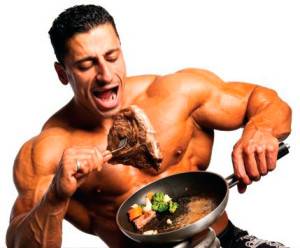 How much protein per day does an athlete need to gain muscle mass?
How much protein per day does an athlete need to gain muscle mass?
Muscles are made up primarily of protein. Like most tissues in the body, muscles are constantly being destroyed and rebuilt. To build muscle, the body must synthesize more muscle protein than it breaks down. In other words, the body must have a positive protein balance (or nitrogen balance, because there is a lot of nitrogen in the protein).
For this reason, people who want to build large amounts of muscle should eat more protein (and lift weights, of course). It has long been known that consuming high amounts of protein helps increase muscle mass and strength. In addition, people who want to shed excess fat and maintain lean muscle should increase their protein intake as this will prevent the loss of muscle mass that usually happens when you diet.
When it comes to muscle mass, studies usually do not look at the percentage of calories from daily energy intake that comes from protein, but rather grams of protein per unit of body weight. The general recommendation for building muscle is 2.2 grams of protein per kilogram.
In numerous studies, scientists have tried to determine the optimal amount of protein to enhance muscle growth, and many of them have received different results. Some studies show that eating more than 1.6 grams per kilogram is of no benefit, while others argue that consuming a little more than 2 grams of protein per kilogram is ideal. While it's hard to give exact numbers due to conflicting research results, 1.5-2.2 grams (give or take) per kilogram of body weight seems reasonable.
If you have a lot of excess body fat, then you should use your existing muscle mass or desired mass in the calculations, and not your total body weight, because only the muscles determine your need for protein.
conclusions: It is important to eat enough protein if you want to build and/or maintain muscle. Most studies show that a protein intake of 1.5-2.2 grams per kilogram of weight is enough. And do not forget about carbohydrates if you need to gain mass. The body needs a lot of energy to build new muscle structures, which means limiting itself to one protein is not enough.
When Can Protein Needs Increase?
 If you do not take into account muscle mass and physique, people who are physically active need more protein than people who lead a sedentary lifestyle. If your work is related to physical strength, you walk a lot, run, swim or do some kind of exercise, then you need more protein. Endurance athletes need about 1.2-1.4 grams of protein per kilogram of weight.
If you do not take into account muscle mass and physique, people who are physically active need more protein than people who lead a sedentary lifestyle. If your work is related to physical strength, you walk a lot, run, swim or do some kind of exercise, then you need more protein. Endurance athletes need about 1.2-1.4 grams of protein per kilogram of weight.
Older people require significantly more protein, almost 50% higher than standard dietary recommendations, or about 0.9-1.2 grams per kilogram of body weight. In this amount, it will help prevent osteoporosis and sarcopenia (decrease in muscle mass) - significant problems of old age. People who are recovering from injuries also need more protein.
conclusions: The need for daily protein intake is significantly increased in people who are physically active, as well as in the elderly and people who are recovering from injuries.
Are there any negative effects of taking protein?
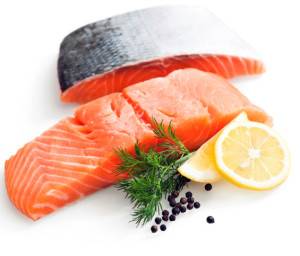 Protein has been unfairly blamed for a number of health problems. It is believed that diets high in protein can lead to kidney damage and osteoporosis. However, these claims are not supported by scientific evidence. While protein restriction will benefit people with pre-existing kidney problems, it has never caused kidney damage in otherwise healthy people.
Protein has been unfairly blamed for a number of health problems. It is believed that diets high in protein can lead to kidney damage and osteoporosis. However, these claims are not supported by scientific evidence. While protein restriction will benefit people with pre-existing kidney problems, it has never caused kidney damage in otherwise healthy people.
In fact, high protein intake can lower blood pressure and help fight diabetes, both of which are major causes of kidney disease. Even if the protein does have a detrimental effect on kidney function (which has not been proven), its positive effect outweighs all negative effects.
Protein is thought to be the cause of osteoporosis, which is odd because studies actually show that it prevents osteoporosis from developing. In general, there is no evidence that a reasonable intake of high amounts of protein has any negative effect on healthy people.
conclusions: Proteins do not have any negative effects on the kidney function of healthy people. Studies show that protein intake leads to improved bone health.
How to Get Enough Protein in Your Diet
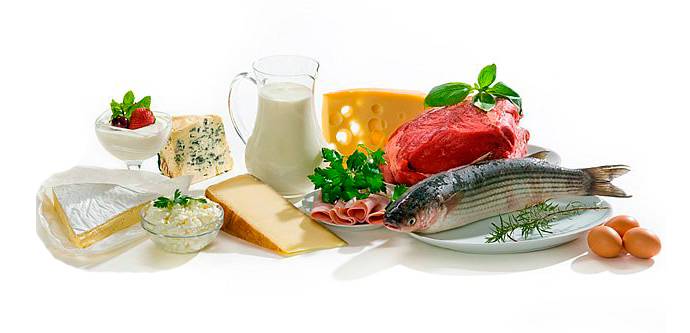
The best sources of protein are meat, fish, eggs and dairy products. They contain all the essential amino acids your body needs. There are also several plants that are fairly high in protein, including quinoa, legumes, and nuts.
For most people, monitoring your protein intake is not necessary at all. If you're just trying to stay healthy, eat quality protein (and don't forget nutritious plant foods). This will be enough to keep your protein intake in the optimal range.
What "Gram Protein" Really Means
This is a very common misconception. When we say “grams of protein,” we mean grams of protein as a macronutrient, not the weight of a food, such as meat or eggs.
226 grams of beef actually contains only 61 grams of protein. A large egg weighs 46 grams, but it contains only 6 grams of protein.
Daily Protein Value for the Average Person
If you have a normal weight, you are not involved in weightlifting or professional sports, then 0.8-1.3 grams of protein per kilogram of body weight per day will be enough for you.
This amounts to:
- 56-91 grams per day for the average man;
- 46-75 grams per day for the average woman.
But given that there is no verified evidence of harm or benefit from such amounts of protein, for most people it is better to err on the side of more than less.
Information source: http://authoritynutrition.com/how-much-protein-per-day/
minuskilo.com
What makes muscles grow? Protein for muscle growth. How much to "hang"?
With this note, we close (but this is not accurate :)) the “Muscle Inside” cycle, which is dedicated to the internal processes that take place in the muscles. All previous articles, in particular, [static muscle work] and [training at age] were of a training nature, the current one is nutritional and it will give us the answer to the most pressing question - how much protein is needed per day for muscle growth.
Well, we will begin our story, as usual, from afar ...
Note:
For a better understanding, all further narration on the topic of what muscles grow from will be divided into subchapters.
Physique Change: Two Focus Points
Why do you think many ladies cannot lose weight? Or, having done this, then gain weight again? Everything is very simple: the young ladies, in principle, do not correctly approach the solution of this issue. They (in the context of this article we will choose abstract women and we will talk about them in 3 face) are trying to reduce the percentage of fat in the body through various diets. In addition to diets, various “accelerator” and f / f exercises are connected, which lead to increased calorie consumption: burpees, rock climbers, etc.
It would seem that the strategy is correct - we reduce the intake of calories through diet gatherings, we increase the energy consumption of the body through exercise. However, in this situation, the quality of your physique will not improve in any way, and mirror changes in the figure will be noticeable only to you.
The thing is that when using the “diet + light-intensive exercise / training” strategy, the impact is on only one parameter that is responsible for the quality of the physique - fat mass. Yes, the percentage of subcutaneous fat in the body of a woman engaged in this strategy is reduced. However, the most important parameter, muscle mass, does not change much.
As a result, after 2-3 months of following such a regime, a woman discards 5 kg (in the limit, the value can reach up to 10 ). But after the cessation of exercise, the weight can easily return to the previous mark. This happens because (we fix nutrition with a constant, i.e., an unchanging value) that the body does not have an “anchor for weight stabilization” (that’s bent :)). And that is a sufficient percentage of muscle mass. The higher this percentage in the body (both female and male), the higher the quality of your physique, the longer the person “lingers” in good shape.
Thus, the two points of focus in changing the physique are the reduction in the percentage of fatty tissue and, in parallel, the increase in muscle mass.
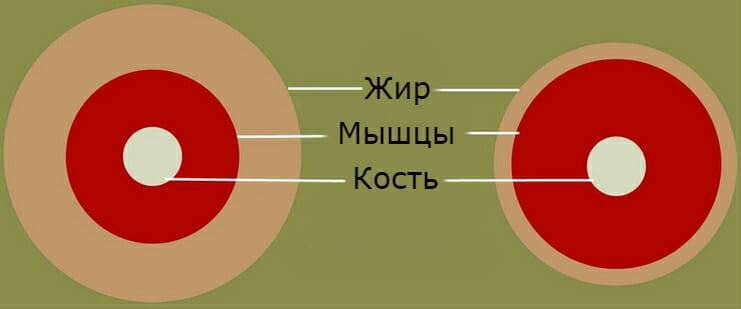
Muscle and fat: what are the fundamental differences?
In terms of changing and improving the physique, it is necessary to understand why strength training is preferred over circuit / HIIT.
The thing is that muscles are a metabolically active structure, and the more your body “carries” them, the more calories you burn throughout the day.
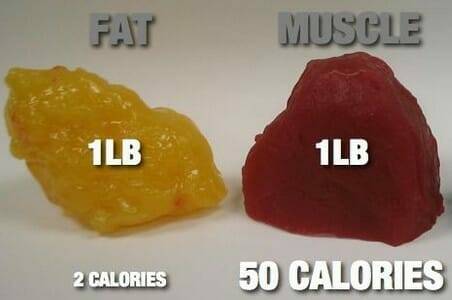
Note:
Often on the project, when drawing up nutrition plans specifically for girls, they have a misunderstanding: how can she lose weight on the new PP, which has more meals than she had before. And the portions of each reception in volume significantly exceed its usual ones. The answer lies in the “replacement” of fat with a more metabolically active structure - muscles, which grow with a predominantly strength type of training. During this "replacement" 1 pound ( 0,45 kg.) of muscle spends on itself 8-10 kcal, a 1 pound of fat 2-3 kcal per day.
Now let's find out...
Is muscle really heavier than fat?
No. Weight of one kg. fat and one kg. muscles is the same, however, the first one takes up much more space / space in the human body.
One kg. pomegranates weigh as much as one kg. tangerines, however, the number of the latter will be different, they will fill the "box" in a different way. For clarity, we give the following illustration (yellow circles are fat cells, red circles are muscle cells).
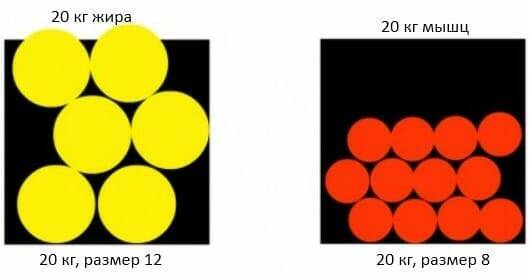
Muscles are denser and more compact in structure, if they filled the “box / container” to the very top, then it would weigh more.
Conclusion: in the process of working on your physique, you can lose fat and gain muscle, and in fact this will be reflected on the scale by the deviation of the arrow to the right (the weight has become more than it was originally), but with all this, the size of the dress / trousers may become smaller.
Actually, we have analyzed the general issues related to improving the physique. Now is the time to start building muscle building material. And we'll start with...
Top 3 Protein Myths
No. 1. Diets high in protein can "plant" the kidneys
For the current ( 2017 there is no study that confirms that a high-protein diet causes any kidney damage or dysfunction in healthy people. On the contrary, in the International Journal of Sport Nutrition (USA, 2016 ) published data that showed bodybuilders following a high protein diet did not negatively affect their blood/urine values in any way.
Conclusion: if you do not initially have diagnosed / confirmed kidney problems, you are not a professional athlete who is preparing for a high-level competition, then high-protein nutrition in no way (ceteris paribus) can damage your kidneys.
No. 2. only 30 grams per dose
Another myth about protein, saying that at one time you need to consume no more than 30 grams of protein, and more of it is not absorbed by the body.
Numerous scientific experiments of laboratories for the study of sports nutrition, in particular, Supplement Lab USA, indicate that the human body is able to digest at one time 30, 40 and even 80 grams of protein per meal. That is, conditionally, everything that a person takes from protein foods. However, from the total amount absorbed, he will use only the amount of protein that is needed to restore muscle tissue. Excess protein will be used to solve other problems of the body or used as energy.
Number 3. too much protein will make me fat
It is a myth. Protein is a macronutrient responsible for a wide range of functions in the body, from DNA replication to the transport of molecules. Protein alone (a high protein diet) does not make a person fat because the pathways that allow protein to be converted into fatty acids are so small that they will not cause fat to accumulate. In addition, the protein “releases” the hormone glucagon, which is responsible (including) for burning fat, helping to stabilize blood sugar levels. Also, the protein has a thermogenic effect, i.e. promotes calorie consumption.
With the mythical part finished, let's move on to ...
Three “sacred” rules of protein intake for muscle growth/recovery: when and how much
Sacred in this case means that they must not be violated under any circumstances.
So, in order for your muscle growth to occur on an ongoing basis, watch out for the following: 3rd rules:
- consume easily digestible protein (liquid form, sports nutrition) and simple carbohydrates during 5-90 minutes after training in the ratio 1: 2 ;
- take a protein (casein or isolate/hydrolyzate) before bed.
We have already discussed the first point more than once in our previous articles, i.e. after training, it is advisable to take a homemade protein shake or protein / gainer from sports nutrition. The only nuance here is that it is better to dilute sports nutrition on water (and then it is better to choose a jar with some kind of taste), and from home-made cocktails, give preference to those that have a fast carbohydrate component (for example, honey, sugar or jam) , and it overlaps the protein minimum by an order of magnitude. In other words, an HM cocktail should, conditionally, contain:
- for body types - mesomorph, endomorph - 15 grams of protein and 30 grams of carbohydrates;
- for body types, pure ectomorph - 15 grams of protein and 45 grams of carbohydrates.
The second rule is to take protein before bed, advocated by nutritionists and doctors of sports medicine. For example, a study published in the journal Med Sci Sports Exerc. 2012 Aug, 44(8) showed that during sleep, casein protein was efficiently digested and absorbed, resulting in a rapid increase in circulating amino acid levels that were maintained throughout the night.
Protein before bed increased the rate of whole body protein synthesis ( 311±8 against 246 ± 9µmol kg per 7,5 hours) and improved net protein balance ( 61±5 against - 11±6µmol kg per 7,5 hours). In addition, mixed muscle protein synthesis rates were at 22% higher (than in the case when the athlete just went to bed and did not take protein at night) and reached the borderline value.
We will consider the third rule separately from this “heap”, and it concerns ...
Rule number 3. How much to hang in grams, or the optimal dose of protein after a workout
What do you think, are you “loading” with protein after a workout? Sports scientists from McMaster University (Canada) will help us figure this out. It is they (at least, as several sources on the network claim) in 2008 was the first to develop a gram for the optimal dose of post-workout protein.
Their experiment was as follows: after strength training, groups of athletes were given a protein shake with different amounts of protein to drink: 20, 30 and 40 gr, respectively. Later 3-4 hours, scientists measured the accumulation of muscle fiber and metabolism of amino acids. They presented the data in the form of the following graph, reflecting the effect of cocktails on fractional protein synthesis (FSR) - muscle building.
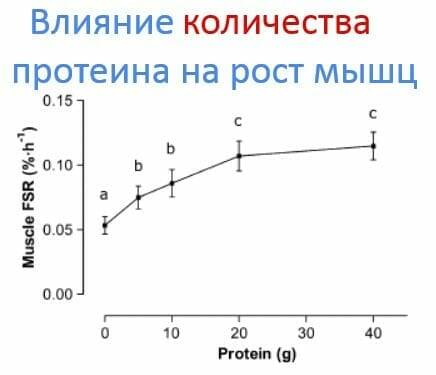
Admission to 20 grams of protein had the greatest effect - it increased muscle fiber production by 93% compared to a training session after which no protein was consumed. A higher intake is unlikely to have any additional muscle building effect. All attempts by athletes to take more than 20 gr led to the burning of amino acids (oxidation of the amino acid leucine in the blood).
Conclusion: muscle and plasma protein synthesis were maximally stimulated with 20 grams of dietary protein, which allows you to approve the value in 20 units as the upper limit of the protein pool (the amount of protein consumed immediately after training).
Note:
This value does not imply a gender division of athletes, i.e. relevant for "m" and "f".
We have decided on a gram of protein on the day of training, now we will find out ...
What makes muscles grow? How much total protein should be consumed per day. Recommendations for different situations/purposes
2-2,5 grams per 1 kg minimum weight or 1,5 gr for "eyes" - recommendations that are replete with the Internet regarding the necessary and sufficient grams of protein. These values are not taken from the ceiling - this is the supposedly unspoken protein standard by weight, which lobbies most of the diet/fitness resources on the network and gym instructors.
So here it is 2-2,5 gr for men and 1,5 gr for women - fake standards. Real ones are completely different, and they depend on:
- the person's age;
- goals in relation to your figure;
- the enzymatic system of a particular person.
Below we provide a summary table that takes into account the first two factors - age and goals.
So, remember your “normative” protein values (in terms of 1 kg of desired weight).
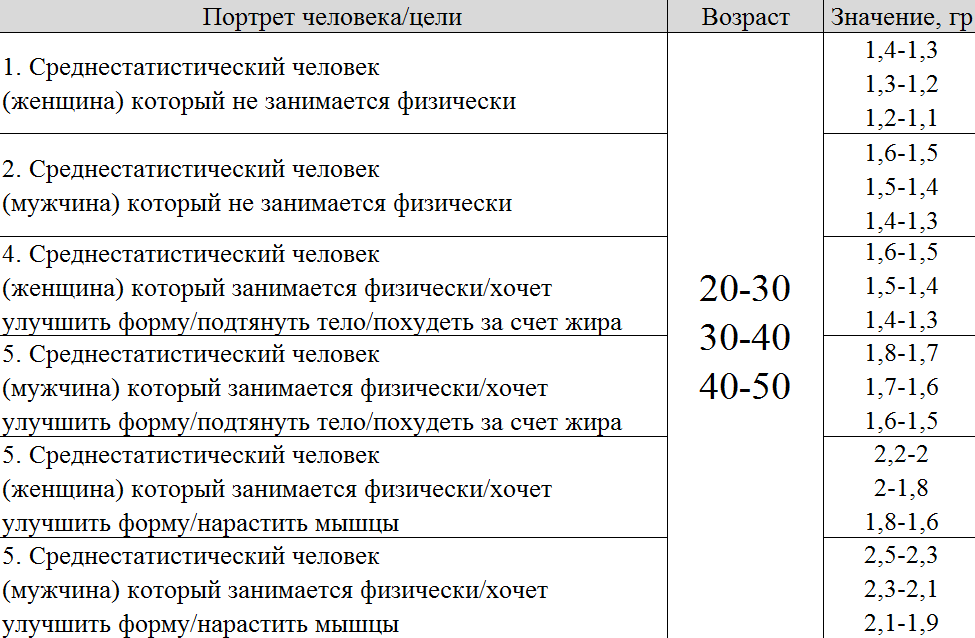
Note:
In this case, normative means that the movement towards the goal must begin with these grams, i.e. they are some starting points that can change their values (both up and down).
To calculate your individual protein amount, multiply your desired weight by the value shown in the table. For example, you are a girl 25 years, belong to the second category (i.e. in the table you go under №2 ), have a weight 60 kg, if you want 55 . So your starting point for protein will be 88 g per day ( 55x1.6). If you are satisfied with the current weight in 60 kg, but I would like to improve the quality of the physique, then the protein norm (starting point) will be 96 g per day ( 60x1.6).
Note:
To find out how many calories from your diet come from protein, multiply your total protein per day by 4. 352/384 (88/96x4) kcal - values for our example.
We found out how much protein you need to consume for 1 once after a workout, how much it should fall on your weight per day, it remains to figure out ...
Do I need to adjust the protein gram value downwards on rest days?
Muscle recovery is a relatively long process, which is individual for everyone (it takes a different amount of time). After a workout, muscles need up to 72 hours. Throughout this time, there should be an adequate (corresponding to your goals) level of amino acids in the bloodstream. Therefore, in most cases there is no question of reducing the proportion of protein in the diet, i.e. amount of protein on rest days = amount of protein on training days. But what should be cut down a little is the ZhU-components.
Note:
Consuming less protein on rest days than training days is a recommendation for endomorphs who want to lose weight. On average, the difference should be: 0,1-0,3 gr on 1 kg of weight is less than on the days of classes.
Well, we figured out the protein ... It remains to go through fats / carbohydrates. But we will deal with this in detail next Friday. How? Do you support?
Afterword
Today we have learned everything there is to know about the accepting aspect of protein. Now you know what muscles grow from, how much protein is needed for this, in which “windows” it is best to consume it. In the final part of the “Muscle Inside” cycle, we will talk about two other nutrients - fats and carbohydrates. We are waiting!
PS: How much protein do you consume? Why exactly so many?
PPS: did the project help? Then leave a link to it in the status of your social network - plus 100 points to karma guaranteed ????
Download articleto pdf>>
With respect and gratitude, Dmitry Protasov.
ferrum-body.com
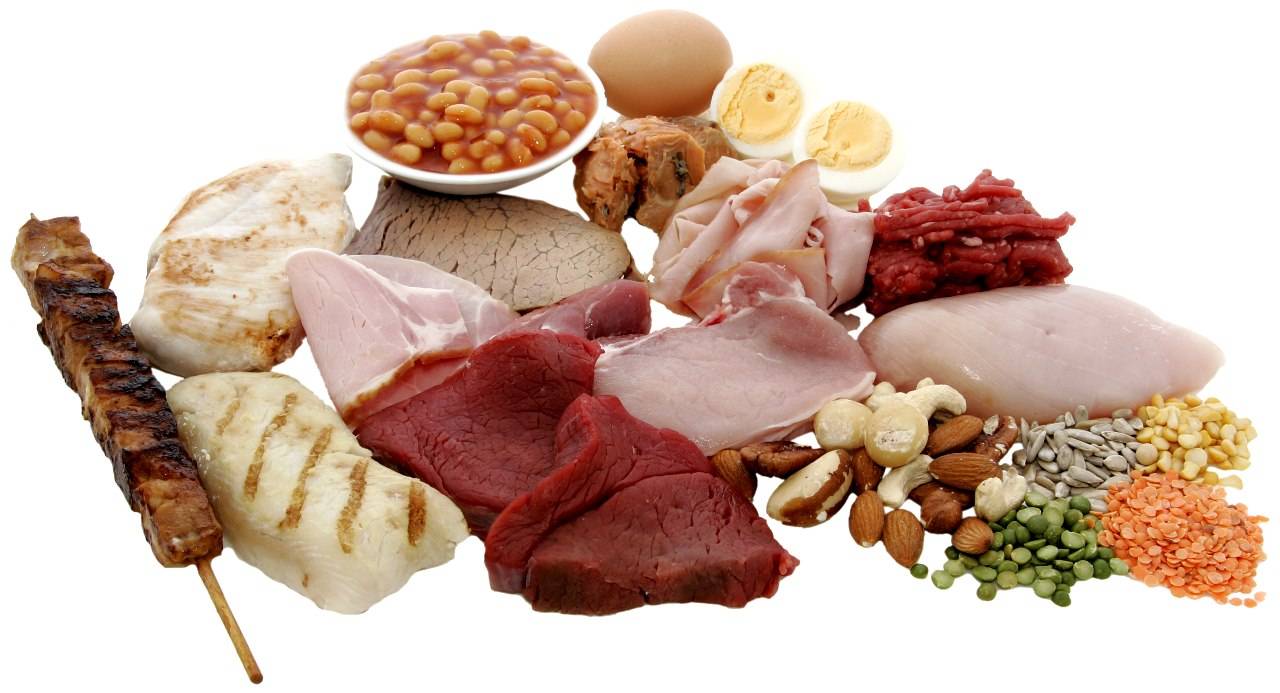
Protein intake for bodybuilding athletes has long been an integral part of their diet. Protein is very important for muscle growth, but we are all likely to consume too much of it.
Norm - 2.2 grams per 1 kg of body weight
At one time, it was found that when exercising with weights, the optimal daily intake of protein is a value equal to 1 g. per pound of body weight, that is, approximately 2.2 grams per kg. However, no one has ever thought about how much the body is really able to absorb during the day?
A very high protein intake is, on the one hand, a phobia of athletes (they say, the more protein you eat, the more muscle mass it will give), and on the other hand, the result of marketing companies producing and selling sports nutrition. We are constantly urged to consume different types of proteins, amino acids and other products as often as possible, but scientific studies almost never find support for these recommendations.
How much protein do you need? Scientific research.
Study #1 : In 1992, Tarnopolskyetal found no difference over a two-week period in total body protein synthesis or lean body mass index in strength athletes consuming 0.64 g/lb (1.4 g/kg) or 1.10 g/lb (2 .42 g/kg). Protein oxidation increased in the high protein group, indicating nutrient overload.
Research #2 : In 1988, Walbergetal reported that 0.73 g/lb (1.6 g/kg) was sufficient to maintain a positive nitrogen balance in weightlifters over a weekly weight loss period.
Study #3 : In 1988, Tarnopolsky et al found that only 0.37 g/lb (0.8 g/kg) is required to maintain a positive nitrogen balance in high level bodybuilders (5 years of training, possible prior androgen use) for 10 days, 0.45 g/lb (0.99 g/kg) is sufficient to maintain lean body mass for more than 2 weeks. The authors note that 0.55 g/lb (1.2 g/kg) is sufficient for bodybuilders.
Study #4 : In 1992, Lemonetal found no difference in increases in strength and muscle mass in novice bodybuilders consuming 0.61 g/lb (1.34 g/kg) or 1.19 g/lb (2.6 g/kg) for 4 weeks. kg). Based on nitrogen balance data, the authors recommend 0.75 g/lb (1.65 g/kg).
Study #5 : In 2006, Hoffmanetal found no difference in body composition, strength, or resting hormone levels in strength athletes consuming 0.77 g/lb (1.7 g/kg) or >0.91 g/lb (2.0 g/kg) for a period of 3 months.
Study #6 : The more experienced the athlete, the less protein he needs. This is due to the development of the adaptive abilities of the body to more effectively inhibit the process of protein breakdown (catabolism) as a result of training. Requires less protein for recovery, increases nitrogen retention, and decreases overall protein requirement for muscle growth (Rennie & Tipton, 2000; Hartman, Moore & Phillips, 2006; Moore et al., 2007).
Based on these studies, scientists came to the conclusion that the upper limit of daily protein intake should not exceed 1.8 grams. per kg of body weight.
I also present an illustration that clearly demonstrates the relationship between daily protein intake and the rate of protein synthesis (muscle growth). As you can see, the value of 1.8 g per kg is an extreme point, after which the increase in the amount of protein consumed does not bring any benefit.
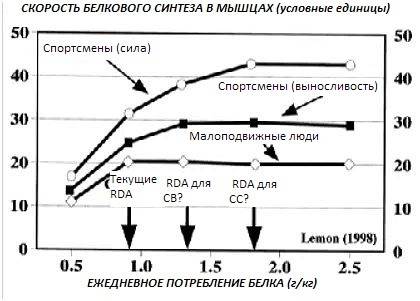
Conventions:
- RDA is the Recommended Daily Allowance for Protein.
- ST - athletes involved in endurance sports.
- SS - athletes involved in power sports.
Correct conclusions
Thus, a strong opinion that athletes involved in bodybuilding and aiming to gain muscle mass should consume up to 3 grams. protein per kg of weight has no scientific justification. The upper limit of the norm is 1.8 g/kg. At the same time, for athletes practicing multi-repetition endurance training, this value will be even lower than 1.3-1.4 g / kg (see graph), and for people who do not go in for any sports at all - less than 1 g / kg per day.
The myth about the need for large amounts of protein for bodybuilders came from professionals training with the use of pharmacological hormonal drugs. By powerfully affecting the hormonal function of the body, they can absorb much more protein and get a multiple of the anabolic response. However, for amateur athletes who do not use anabolic steroids, this approach is not correct, because it leads to an overload of organs and systems, an increase in the cost of protein food and sports nutrition, and at the same time, does not provide any advantages in muscle mass growth.
www.iron-health.ru
What do proteins mean for the human body? Without any doubt, you can answer that a lot. After all, it is protein that is the building basis for the growth and restoration of absolutely all biological tissues of our body.
Why does the body need protein?
No enzymatic activity is possible without protein, since all enzymes contain protein components. If you analyze any single hormone, it will turn out to be a protein. Plasma (humoral) immunity factors are complex protein complexes. The contraction of absolutely all muscles, in particular, the respiratory muscles, occurs solely due to the specific interaction of actin and myosin proteins.
Finally, the well-known hemoglobin, which carries vital oxygen in the composition of erythrocytes, is also a protein with a complex quaternary structure. This small list is enough to realize the impossibility of our body's vital activity without proteins.

Every day, the human body consumes a certain amount of proteins for its needs, which is why daily replenishment of this organic material is required to restore the necessary supply of protein. It is known that the main route of protein intake is, of course, food products. However, protein is a rather complex high-molecular component, which, in order to be absorbed, must first be broken down into smaller particles.
These constituent components of the protein are amino acids - in other words, the structural units of the protein. To date, about a hundred amino acids are known, but only about twenty are actively involved in the metabolism of our body. With insufficient intake from the outside, some of them can be independently synthesized in the body, others do not have this ability, so amino acids are divided into interchangeable and irreplaceable. Thus, essential amino acids in our body should come only with food.
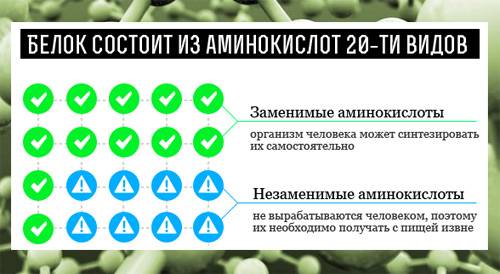
How much protein should be consumed for the normal functioning of various body systems?
Scientists have been searching for the answer to this question for decades. Despite the fact that in the 19-20 centuries the daily protein requirement for the body ranged from 26 to 136 grams. Such a difference in opinion was explained by the reactionary views of some scientists who acted on the instructions of the government, and also by insufficient consideration of all the reasons that can change the daily requirement for protein in one direction or another.
Currently, 100-120 grams of protein per day is considered sufficient for a person. More precisely, this amount is displayed by a proportional ratio of protein to body weight, this is how you can determine the individual need for protein, based on the fact that 0.8-1.1 grams of protein should be per kilogram of weight. But, as we mentioned above, the right amount of protein for a person per day can vary.

So, for example, during physical or mental stress, the need for proteins increases, which is why the lifestyle of each individual person, as well as his profession, plays an important role here. By about ten percent, you need to increase the protein diet for pregnant women, and for nursing mothers - by twenty.
If you are losing weight, then you need to consume daily 1.5-2 grams of protein per 1 kg of your weight. But remember that at one meal the amount of protein should not exceed 30 grams, otherwise the excess protein will not be absorbed by the body. If your weight is more than 100 kg, then do not consume more than 200 grams of protein per day.

What causes protein deficiency in the body
When losing weight, a lack of protein will affect the muscles and you will lose weight at the expense of muscle, and not at the expense of fat. Lack of protein in the body leads to a number of pathological conditions that are associated with hormonal imbalance, insufficiency of enzymatic systems, and a number of other factors. A person develops alimentary (food) dystrophy, brain activity is disturbed, the work of hematopoietic organs, the liver, and many other systems worsens.
Protein deficiency has a very adverse effect on the child's body: the baby lags behind in growth, in physical and mental development. With a protein deficiency in the pituitary region of the brain, a deficiency of specific cells also develops. The function of these cells is to produce growth hormone, which is responsible for the growth of the child's body. With severe protein deficiency, there may even be death from dystrophy.
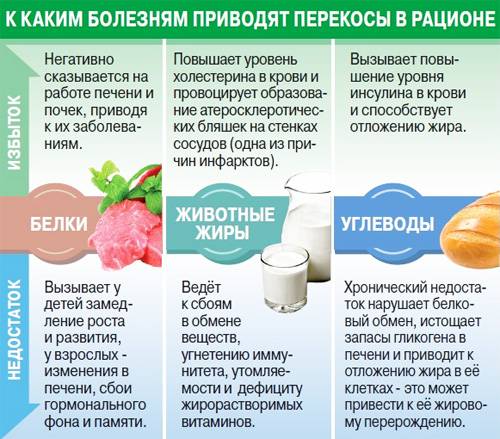
The main sources of protein are meat, poultry, fish, eggs, cheese, cottage cheese, and other meat and dairy products. Such a protein is called an animal. Peas, beans, nuts contain vegetable proteins, which are necessary, first of all, for the construction and growth of all tissues and organs. Least of all protein in berries and fruits. It is worth saying that, on average, animal products contain more proteins, in addition, they have a properly balanced amino acid composition, and this is important for normal digestion, for the absorption of protein components.
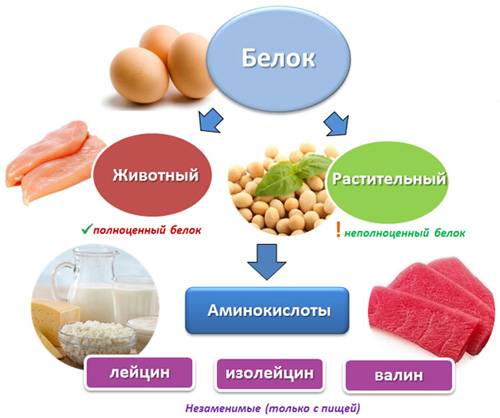
However, you should not overeat protein foods. When overeating in the intestines, putrefactive processes intensify, and this leads to the formation and absorption of toxic decay elements into the blood.
www.calorizator.ru






